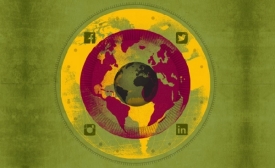nation branding
While Castillo is not a diplomat, the gregarious restaurateur has made Caribeno a cultural outpost for his country. Chinese and expats come not only for the food but the lively music and the recently organized Friday-night salsa performances. Photos on the wall include ambassadors and entrepreneurs from many Latin countries, as well as scenes of Havana life, Caribbean beaches and icons like Che Guevara, who looks across the restaurant from an enlarged print of a Cuban 3-peso bill.
Brand SA and Brand Finance will tomorrow announce the country’s top 50 commercial brands. Why does this announcement matter to our overall nation brand, competitiveness and reputation? These brands contribute to strong and positive associations of SA across the globe.
A few years from now, the average tourist won’t be found gliding down a Venetian canal or perched atop the Empire State Building. They’ll be in lounging by a pool in Dubai, or shopping at a massive mall in Singapore, or doing God-knows-what in Bangkok. This is according to the latest MasterCard Global Destination Cities Index, released last week.
The Korean authorities have also put in place some useful facilities. “Global centers” have been built around the country, catering to the needs of foreign spouses, foreign investors, migrant workers, and tourists. Information desks have been set up for foreigners who may need information, especially in spots highly frequented by migrants. Foreigners are also increasingly visible in the media, participating in entertainment shows or in the news. Cultural events have been initiated to promote Korean culture to foreigners and foreign culture to Koreans.
In the first three months after the December 2012 incident, foreign female tourist arrivals dropped in India by 35 percent. It hasn't helped that since then, there have been a spate of sexual assault cases involving attacks on Western female tourists, including women from theUnited States, Switzerland, Denmark and Britain. Recently, Great Britain joined a long list of countries to issue travel advisories cautioning their citizens about visiting India.

The current UNO publication, Numero 17, La Nueva Diplomacia, features articles focusing on new diplomacy and international relations, and includes a piece by CPD Director, Jay Wang titled Nation Branding Revisited. Other articles cover topics ranging from Soft Power and Digital Diplomacy to Economic Diplomacy and the role of non-state actors in diplomatic relations.
Even normally quiet streets were electrified early Monday by Germany’s dramatic 1-0 win of the World Cup in extra time, a victory that symbolized, at least to fans, not just the country’s dominance of Europe, but its global prominence. Car horns and vuvuzelas honked, and fireworks and firecrackers exploded. On the Kurfuerstendamm, the gleaming street of stores and restaurants that was the symbol of West Berlin during the Cold War, cars quickly jammed traffic and fans draped themselves in the black, red and gold of the German flag.
Sunday’s final concluded a monthlong tournament that presented a jarring contrast between Brazil’s hosting of the tournament and its achievement on the field. The World Cup was well organized despite fears that it would be chaotic. The Brazilian people were hospitable. The soccer was largely attractive and attacking. Some have called this the best World Cup in recent memory. Soccer became so absorbing that widespread protests - against perceived wasteful spending on the World Cup and the 2016 Rio Olympics - did not occur after undermining a warm-up tournament last year.







